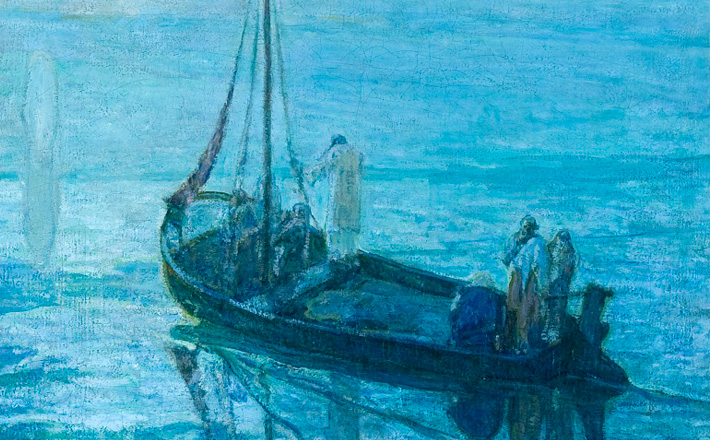Commentary on Genesis 37:1-4, 12-28
This reading could be titled “The Pinnacle of Sibling Rivalry.”
Of course, this is not how the story is usually told. In the previous chapter, an old rivalry is put to rest: “And Isaac breathed his last; and he died and was gathered to his people, old and full of days; and his sons Esau and Jacob buried him” (Genesis 36:29). This act is sandwiched between the list of Jacob’s sons (35:22b-26) and of Esau’s (36:9-13). The family that was fractured by the treachery of Rebecca and Jacob was reconciled. Our hope is that children will learn from our mistakes and our fear is that they will repeat them. This is a story of the latter.
Genesis 37 begins with hope, “This is the story of the family of Jacob” (37:2a). But that optimism does not last. One of the first things we learn is Joseph was a bit of a tattle-tale (37:2b). There is nothing here to indicate what Joseph said, or whether it was correct. The Hebrew construct can mean “lies” (Hebrew: evil whispering). The next verse may explain why Joseph’s behavior. It is a painful verse to read, “Israel loved Joseph more than his other sons.” It appears there is discord in Jacob’s house. The same tension seen in Jacob’s preference for Rachel is being lived out in the next generation. He favored Joseph and gave him a gift of a garment. The coat or tunic has a history of its own. The Hebrew wording of “a tunic of the sole of the foot/palm of the hand,” is problematic. The Septaugint (LXX) uses the words, “a tunic of diversity/various elements,” that developed into the understanding of the famous coat of many colors. The point here is not the coat or how it was made, but that this gift was given to one of his 13 children. It is typical sibling behavior to think a parent likes one child better than another, but Jacob proves his preference with a gift. Joseph was set against his brothers by their father.
In the section omitted from this week’s texts, Joseph tells his brothers of two dreams where others bow down to him. The brothers interpret Joseph’s dreams as further evidence of his youthful arrogance (Genesis 37:5-8), and after the second dream, even Jacob also rebukes his son (37:10). So Joseph is not innocent when it comes to his relationship with his brothers. He appears to be taking full advantage of his favored status. My grandmother would have declared that Joseph was acting “too big for his britches.” He is not only the favorite, but he rubs it in the faces of his brothers.
Eventually, this leads to the text for today. Jacob’s sons were tending the herds. Jacob sent Joseph to check on them, and this should be read in light what happened the last time he checked on his brothers. When they saw Joseph coming toward them, they said: “Let’s kill him, throw him into a pit, and tell Dad he was killed by a wild animal.” Is this meant as a serious death threat or hyperbole? I have had teenagers in my house, and it was not uncommon for one to swear out an oath of murder on the other. Do not misunderstand; I am not justifying what they did, only the way we hear it. Until the brothers act on their anger, they are acting just like brothers do. Reuben, the oldest, steps up to appease the anger of the siblings. He suggests throwing him into a pit. Verse 22 states Reuben did this because he intended to come back to the pit and rescue his baby brother. The brothers would get their revenge and Joseph would hopefully learn something and rejoin the family. Reuben is acting like the oldest brother and the go’al for Joseph. The whole thing goes sideways because the brothers sell Joseph to the Ishmaelites instead. Reuben went back to save Joseph and was grief-stricken over his brothers’ rash act (37:29). There is no response from the other nine brothers other than to cover their crime. They never express remorse.
What is a preacher to do with this text? We could skip ahead and make this a story of predestination using Joseph’s words to his brothers in 50:20, “Even though you intended to do harm to me, God intended it for good, in order to preserve a numerous people, as he is doing today.” But that is using this text as a backdrop for another message (next week’s actually). We are left by this text here with no resolution between the nine brothers, Joseph, and Reuben.
Families are difficult. It is the rare family where there is not an estrangement of some kind. Physical or emotional harm also happens more often than we like to acknowledge. Two weeks ago the reading was difficult, and Gospel was hard to find; this week is more of the same. Even Reuben, who did his best to act correctly, was thwarted. How often have we tried to fix a situation and it gets us nowhere? Jacob’s family story offers an opportunity to speak of estrangement and the consequences of rash acts. The story lets us see all the characters and their involvement in this drama.
Estrangement is rarely one-sided. All of the brothers look at each other through the eyes of hurt and anger. Joseph may not see his actions as one of the reasons for his brothers’ contempt. The brothers see only their father’s favoritism and their young brother’s youthful boasting. Joseph thinks of himself as better than his elders.
From our bird’s eye perspective, we can see the conflicts causing the problems. This week’s reading is a lesson in the name “Israel”; in order to survive this story, one must hang on and fight for the presence of God within the tension and harm done within this family of promise. It is not pretty, but it is very real.


August 13, 2017